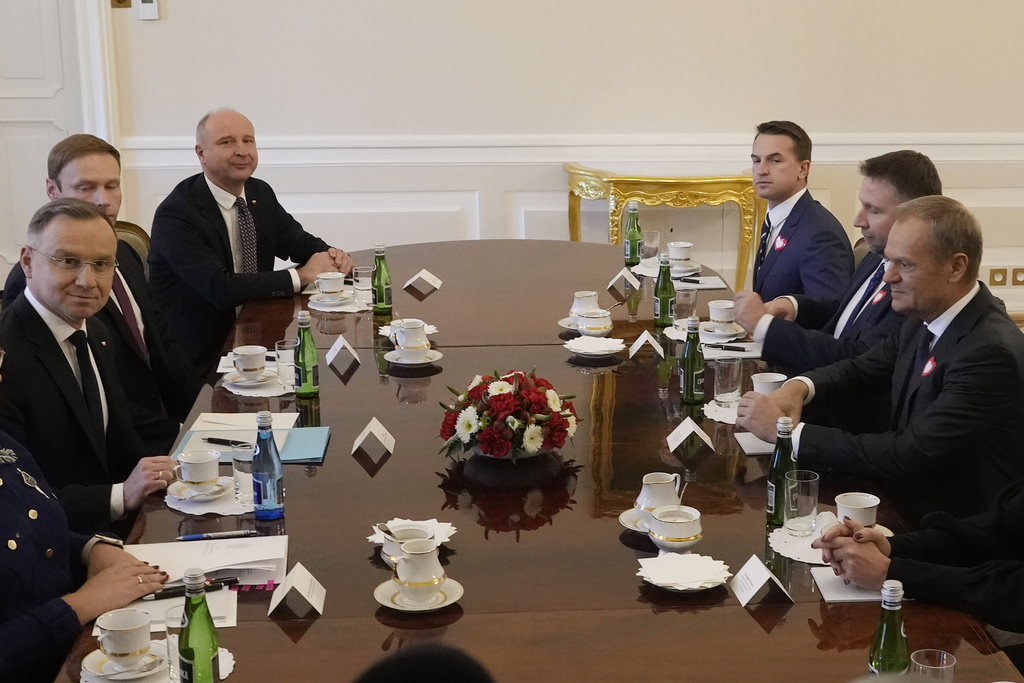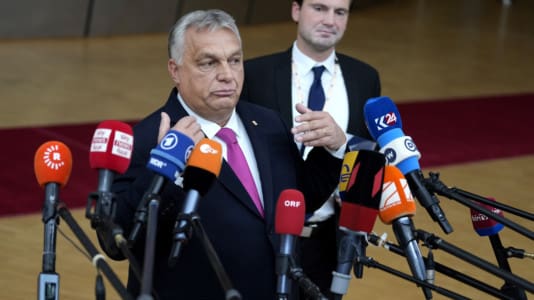Polish President Andrzej Duda announced on Thursday he is facing a dilemma after the liberal and centrist opposition wishing to form the next government revealed it hadn’t yet signed a coalition agreement and incumbent conservative Prime Minister Mateusz Morawiecki assured him that he would amass a parliamentary majority to ensure he can continue to govern.
Duda explained that it was the established custom for the president to ask the leader of the largest party to form the government and he had heard from the present ruling Law and Justice (PiS) party, which topped the poll and won the most seats, that it was willing and ready to do that.
However, he acknowledged that there was another candidate, opposition leader Donald Tusk, who seemed to have the backing of three parties that now have a majority in the new parliament and admitted he was conflicted on what course of action he should take.
The leaders of the three parties: Civic Coalition (KO), the Third Way alliance made up of two centrist parties, and the Left party, were asked by the president on Oct. 24 whether they had a signed coalition agreement and had a cabinet ready to take over the reins of government.
The representatives of the three parties replied that they were in the process of doing that but had agreed that Donald Tusk, the leader of the KO, would lead the government.
Mateusz Morawiecki and the representatives of the conservatives (PiS), who have most seats in the new parliament but no overall majority, spoke to the president first and assured him that they were ready to govern and that, by the time the new parliament meets, they would have a majority in the chamber.
The new parliament will have its first sitting on Nov. 13, a day after the term of office of the present parliament expires.
President Duda had been urged to bring forward the first sitting of parliament but declined on the grounds that there was no constitutional reason to shorten the term of office of the present parliament.
The three parties backing Tusk will have a chance to demonstrate they have a majority in parliament by choosing a candidate for the powerful post of Speaker of the Sejm (the lower house) and electing them at the first sitting of parliament.
As is customary at the first sitting, the present Prime Minister Mateusz Morawiecki has to formally resign and the president then has the duty to nominate a candidate for the post who will then have 14 days to get a vote of confidence in the new parliament.
If the three parties backing Tusk remain solid and elect a speaker of their choice, the president may decide that they have demonstrated they have a majority and choose Tusk to lead the new government. However, he is not obliged to do that by the constitution and may still give Morawiecki another two weeks to attempt to form a government and get a parliamentary vote of confidence for it.
If Morawiecki’s attempts to gain a vote of confidence fail, the parliament has 14 days to vote through a prime minister and government of its choice and the president has no alternative but to appoint it. However, should parliament fail to vote by an overall majority for a new government, the president then has another 14 days to nominate a candidate for prime minister who in a matter of two weeks must win a vote of confidence by a simple rather than overall majority.
The three parties that are backing Tusk are already complaining that the president is being obstructive by giving the PiS, the party that supported his presidency, time to attempt to build a majority when these parties have made it clear that they have a majority to form a government.
However, the devil lies in the details, and the coalition agreement is still some way off, as the three parties admitted when meeting the president. Nevertheless, they are far closer to being able to form a government than PiS, which has no single party willing to enter into coalition with it.
PiS is hoping that they can persuade deputies from the right-wing Confederation party and the Polish People’s Party (PSL) to form what would be a center-right coalition. The PSL, one of the two parties in the Third Way alliance, is more conservative in outlook than its partner Poland 2050 and this gives PiS hope that it could now or in the future be a partner in a governing coalition.
These hopes may have been raised a fraction by the fact the two Third Way alliance parties are forming separate parliamentary caucuses, with the PSL having 32 MPs and Poland 2050 having 33. However, the two worked well alongside each other in the election campaign and there is little or no appetite in the PSL at present for a coalition with PiS, a party that has been very hostile to it.
The widespread expectation is therefore that within weeks Donald Tusk will be prime minister of the multi-party coalition and that PiS will after eight years have to return to being the opposition.






